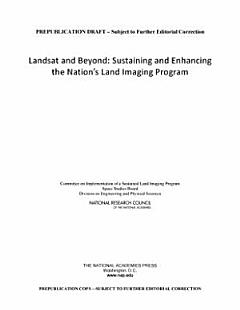In 1972 NASA launched the Earth Resources Technology Satellite (ETRS), now known as Landsat 1, and on February 11, 2013 launched Landsat 8. Currently the United States has collected 40 continuous years of satellite records of land remote sensing data from satellites similar to these. Even though this data is valuable to improving many different aspects of the country such as agriculture, homeland security, and disaster mitigation; the availability of this data for planning our nation\'s future is at risk.
Thus, the Department of the Interior\'s (DOI\'s) U.S. Geological Survey (USGS) requested that the National Research Council\'s (NRC\'s) Committee on Implementation of a Sustained Land Imaging Program review the needs and opportunities necessary for the development of a national space-based operational land imaging capability. The committee was specifically tasked with several objectives including identifying stakeholders and their data needs and providing recommendations to facilitate the transition from NASA\'s research-based series of satellites to a sustained USGS land imaging program.
Landsat and Beyond: Sustaining and Enhancing the Nation's Land Imaging Program is the result of the committee\'s investigation. This investigation included meetings with stakeholders such as the DOI, NASA, NOAA, and commercial data providers. The report includes the committee\'s recommendations, information about different aspects of the program, and a section dedicated to future opportunities.

